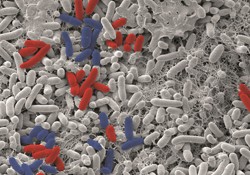Researchers dig into soil biodiversity
Healthy function of soil and its biodiversity is crucial for all aspects of ecology, from agriculture to climate regulation. For example, soil organisms, such as bacteria, fungi and protozoa, provide vital services such as nutrient recycling water distribution and resilience to pollution. Despite its importance for both the global environment and societal welfare, the makeup of soil and its communities is relatively unknown and virtually unregulated. The EU-funded TRAINBIODIVERSE(opens in new window) (Training for functional soil microorganism biodiversity) project bridged this knowledge gap by training young scientists in multidisciplinary aspects and relevance of soil biodiversity. Through a multinational network, TRAINBIODIVERSE provided practical and theoretical guidance to monitor, evaluate and improve the quality of biodiversity in European soils. The consortium encompassed academic, industrial, economic, social and political representatives with combined expertise in all areas of soil ecology and legislation. Since a gram of soil contains thousands of microbial species, TRAINBIODIVERSE trained young researchers to identify key and previously unculturable species to monitor and maintain soil function or quality. These so-called bioindicators are used to gauge the impact of human or natural perturbances such as agriculture, mining or desiccation. Researchers also examined interactions between soil fungi, bacteria, viruses and protozoans. To characterise these complex soil relationships, researchers used a multidimensional approach including DNA analyses and whole field surveys. The technology derived provided a suite of protocols that can be used as a ′biodiversity toolbox′ to show soil microbial quality. The project resulted in close collaboration between natural scientists and economists and social scientists. This has led to improved understanding by end-users of the status of endangered soil biodiversity and drivers of the changes. It also increased public awareness of the possible welfare impacts caused by biodiversity loss and economic instruments for conserving biodiversity and land management. TRAINBIODIVERSE has contributed to a more cost-effective decision support mechanism to the management of soil biodiversity and relevant ecosystems in Europe. It will also help to secure the future of European ecosystem services and agricultural production and thus the wellbeing of EU citizens.







